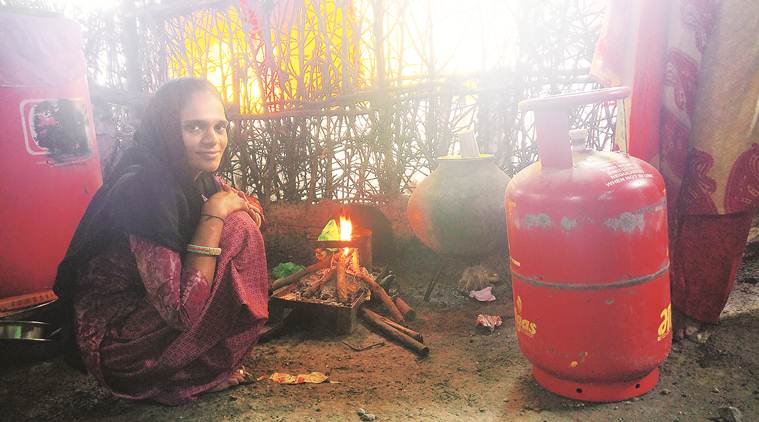
AMIDST the wood smoke that fills her thatched kitchen on the outskirts of Ajanta village in Maharashtra’s Aurangabad district, Ayesha Shaikh’s smile shines brightly. On September 7, Prime Minister Narendra Modi handed the 30-year-old an Ujjwala certificate, making her ‘Beneficiary No. 8 crore’ of the country-wide scheme to provide LPG connections to BPL women.
Besieged by reporters on the occasion, Ayesha enthusiastically announced that the first thing she would cook on her new stove would be biryani. It didn’t exactly work out as planned — and cost was just a part of it.
The shiny-red LPG cylinder, standing in one corner of Ayesha’s 100 sq ft pucca room (the kitchen adjoins it), was delivered on September 10. But the stove that came with it under the Prime Minister Ujjwala Yojana turned out to be defective, and was taken back for replacement. So, on a Wednesday afternoon, the first thing Ajanta ends up making using the cylinder is tea.
She borrows the stove from acquaintance Mohsin Shaikh, and gets barely a sip after sharing the brew with neighbours who have gathered to congratulate her. Most of them already have a gas connection.
Born into a poor family in Aurangabad, Ayesha got married at an early age and has been living in Ajanta, around 400 km from Mumbai, for the past decade. Her husband Rafiq Shaikh makes around Rs 200 a day collecting charity for a local religious institution, for which he gets a commission. They have five children, between the ages of 5 and 12, and pay Rs 800 as rent for the room.
To fire her wood stove, Ayesha had to walk to a nearby forested area once a week to collect firewood — a distance of 5 km going and coming. On every trip she tried to get back enough to see her through the week, hauling it on her head, spending up to seven hours each time.
When she cooked, Ayesha says, smoke would fill the room. “We all suffered. The smoke made me dizzy… imagine the plight of my children.” The three bring the mid-day meal they get at school back home for lunch.
Given their financial condition, Ayesha never thought she could afford LPG. Then, last month, during a casual conversation, a relative told her about the Ujjwala scheme. “I applied soon after. In the first week of September I was told that I would receive the gas connection. On September 6 I received a call that I needed to leave for Aurangabad as I would be meeting the PM,” Ayesha says.
The meeting itself is a blur for the 30-year-old. “I was a bit overwhelmed being on the stage and amidst so many people. All I remember is feeling happy,” she says, adding that she wished her husband and children could have come along. “They watched the footage of the programme later on a neighbour’s phone.”
On the anti-climax after receiving the cylinder, Ayesha says, “People from the gas agency came and installed the connection. Later, we realised there was a hissing sound coming from the stove. I got scared that the cylinder would explode. I called them and they took away the stove saying they would provide a replacement.”
The day being Muharram, Ayesha didn’t do much cooking. On Wednesday, restless to use her LPG, she went to Mohsin’s home next door to ask him to lend her a gas stove.
Ayesha says she has considered what she would do after the first LPG cylinder ran out: she would borrow money “but never let go of the connection”.
As for the biryani, Ayesha says it will have to wait. Meat is a luxury for the family of seven, restricted to once a fortnight. “I had no idea there were so many schemes for the poor,” Ayesha adds. “I will throw a biryani feast once I get my own home under the Pradhan Mantri Awas Yojana.”